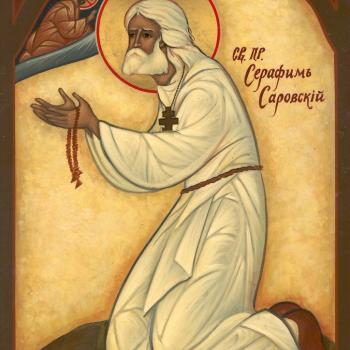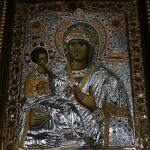
A reading from the Holy Gospel according to Mark:
The Pharisees approached Jesus and asked,
“Is it lawful for a husband to divorce his wife?”
They were testing him.
He said to them in reply, “What did Moses command you?”
They replied,
“Moses permitted a husband to write a bill of divorce
and dismiss her.”
But Jesus told them,
“Because of the hardness of your hearts
he wrote you this commandment.
But from the beginning of creation, God made them male and female.
For this reason a man shall leave his father and mother
and be joined to his wife,
and the two shall become one flesh.
So they are no longer two but one flesh.
Therefore what God has joined together,
no human being must separate.”
In the house the disciples again questioned Jesus about this.
He said to them,
“Whoever divorces his wife and marries another
commits adultery against her;
and if she divorces her husband and marries another,
she commits adultery.”
And people were bringing children to him that he might touch them,
but the disciples rebuked them.
When Jesus saw this he became indignant and said to them,
“Let the children come to me;
do not prevent them, for the kingdom of God belongs to
such as these.
Amen, I say to you,
whoever does not accept the kingdom of God like a child
will not enter it.”
Then he embraced them and blessed them,
placing his hands on them.
The Pharisees approached Jesus and asked, “Is it lawful for a man to divorce his wife?” They were testing Him.
Remember, when you see “Pharisees” in the Gospels, you have to keep in mind that they were Jesus’s own sect. He didn’t see Himself as other than the Pharisees. When He called them out, He was calling out His own. When He showed them the meaning of the scriptures, He was joining in a debate His culture was always having. When you see “Pharisees” in the Gospels you’re supposed to mentally fill in “us, believers, people in the group.” We are the ones who came to Jesus and asked, “Is it lawful for a man to divorce his wife?” and we did it to test Him.
We came to Jesus, who knew there was a loophole in religious law that said a man could divorce his wife. He also knew that we lived in the Roman Empire, where women weren’t legal persons at all. Women had no rights. They only had the privileges their husbands gave them. Some husbands were very nice to their wives, and some weren’t; that was their prerogative. Women were passed around like property. If a man sent his wife away, she was left with nothing.
And Jesus said to us what we didn’t want to hear: “from the beginning of creation, God made them male and female. For this reason a man shall leave his father and mother and be joined to his wife, and the two shall become one flesh. So they are no longer two but one flesh.” A marriage isn’t a man who is a person buying a woman who isn’t, and keeping her until he’d like to get rid of her. God doesn’t see male as greater than female. From the beginning, He is the father of both, and two joined together in marriage are one.
In the house the disciples questioned Him about this. Remember, “disciple” just mean “students, those who follow the teacher.”
The disciples are also us; we questioned Him. Surely it isn’t true! That has to be something He was saying when He bantered with the Pharisees. He can’t really mean it. Surely men still have a prerogative to do whatever they like. But Jesus didn’t back down.
Jesus took it a step further: “For this reason a man shall leave his father and mother and be joined to his wife, and the two shall become one flesh. So they are no longer two but one flesh. Therefore what God has joined together, no human being must separate.” A marriage is not a man buying an accessory, but two persons becoming one flesh. It’s not a father selling his daughter to another man at a price, but a man leaving his own mother and farther to become one flesh with his equal. A man who, in his privileged position, sends his helpless partner away, is committing a sin against her. Even if the society you live in says it’s fine. You have a responsibility.
Meanwhile, people were bringing children to Jesus so He could bless them, but the disciples tried to send the children away. That’s us. We are the disciples again. We shooed the noisy brats away so that we could keep talking with Jesus, and Jesus got angry. “Let the children come to me; do not prevent them, for the kingdom of God belongs to such as these. Amen, I say to you, whoever does not accept the kingdom of God like a child will not enter it.”
Who does the Kingdom of God belong to? It belongs to children.
What were children, in the Roman Empire? Children, like women, were not legal persons. Children were the property of their fathers, as women were the property of their husbands. A man could do anything to his children, legally, because they were his. Children had no legal rights until they grew up, and only then if they were male. Then they could own a wife and children in turn. The Kingdom of God belongs to people the world counts as nothing with no rights at all.
No one can enter the Kingdom of Heaven except as a little child– as someone with nothing, no ability to make a demand, no power to wield over anyone else, just a helpless being who asks for mercy and gets it. Because in the eyes of God, no one is a man– that is, a person who wields power over others and can own them in the eyes of the law. Everyone is a child, just a human, equal to every other human.
And Jesus took the children– us, His children– embraced us, blessed us, and placed His hands on us.
In doing and saying these things, He taught us how Christians are to live.
Whoever has ears, let him hear.
Mary Pezzulo is the author of Meditations on the Way of the Cross, The Sorrows and Joys of Mary, and Stumbling into Grace: How We Meet God in Tiny Works of Mercy.

















